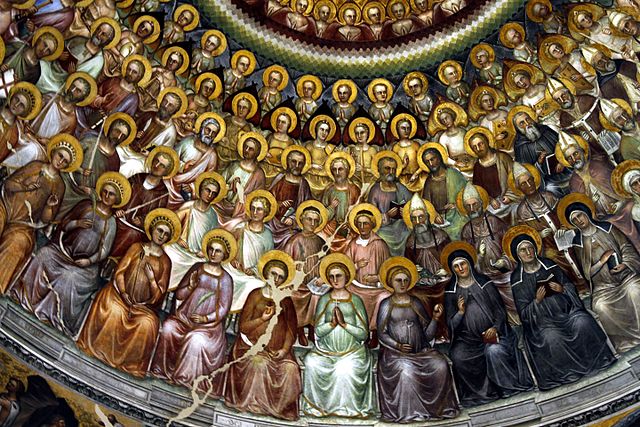
Contrary to many non-Catholic claims, biblical evidence for these practices is abundant.
***
1) We ask others on earth to pray for us.
2) Angels (many passages) and dead saints (Rev 6:9-10) care very much for us.
3) Angels are aware of earthly events (Lk 15:10, 1 Cor 4:9, and many other passages); so are dead saints (Heb 12:1). Moreover, angels are extremely intelligent and can deduce our thoughts and follow our actions.
4) We observe both angels (Rev 8:3-4; cf. Tob 12:12-15) and dead saints (Rev 5:8) presenting our prayers to God, and know from other passages that they intercede for us (Jer 15:1; 2 Macc 15:13-14).
5) The Bible says that the prayers of the righteous are very powerful in their effects (Jas 5:16-18). How much more the prayers of perfected saints (Mt 22:30; 1 Jn 3:2) and always-sinless angels?
6) Men also talk to dead men (1 Sam 28:12-15; cf. Sir 46:20; Mt 17:1-3; 27:50-53; Rev 11:3) and angels on numerous occasions, and angels initiate discourse with human beings (Gen 21:17-18; when Jesus Christ was born); this is scarcely distinguishable from invocation of them.
7) Petitions made to angels are granted (Gen 19, 32, 48).
8) Therefore, it follows that we can ask either to intercede.
***
Often there is confusion over Catholics’ use of the phrase, “praying to saints.” Protestants typically think that we can’t communicate to anyone who is not alive on this earth, and that to do so is tantamount to “praying” to them, and that this is wrong, because [so they claim] one can only pray to God.
They’re wrong. We can ask them to pray for us (which is what Catholics who know anything about their faith mean by “praying to saints”), and that is not prayer, if by prayer we mean (as Protestants believe) only that they grant our requests under their own power. No they don’t. They make powerful requests to God, Who then decides whether to grant our requests or not. They are intercessors to God, not the granters of the prayers.
That said, Catholics often use the phrase “pray[ing] to saints”: meaning “asking them to intercede.” St. Thomas Aquinas makes a very useful clarification:
Prayer is offered to a person in two ways: first, as to be fulfilled by him, secondly, as to be obtained through him. On the first way we offer prayer to God alone, since all our prayers ought to be directed to the acquisition of grace and glory, which God alone gives, according to Psalm 83:12, “The Lord will give grace and glory.” But in the second way we pray to the saints, whether angels or men, not that God may through them know our petitions, but that our prayers may be effective through their prayers and merits.” (Summa Theologica, Second Part of the Second Part, Question 83:4: “Should We Pray to God Alone?”)
***
(originally 10-22-16 and 1-9-17)
Photo credit: Baptistry – Padua, photographed by José Luiz Bernardes Ribeiro (9-15-16) [Wikimedia Commons / Creative Commons Attribution-Share Alike 4.0 International license]
***













